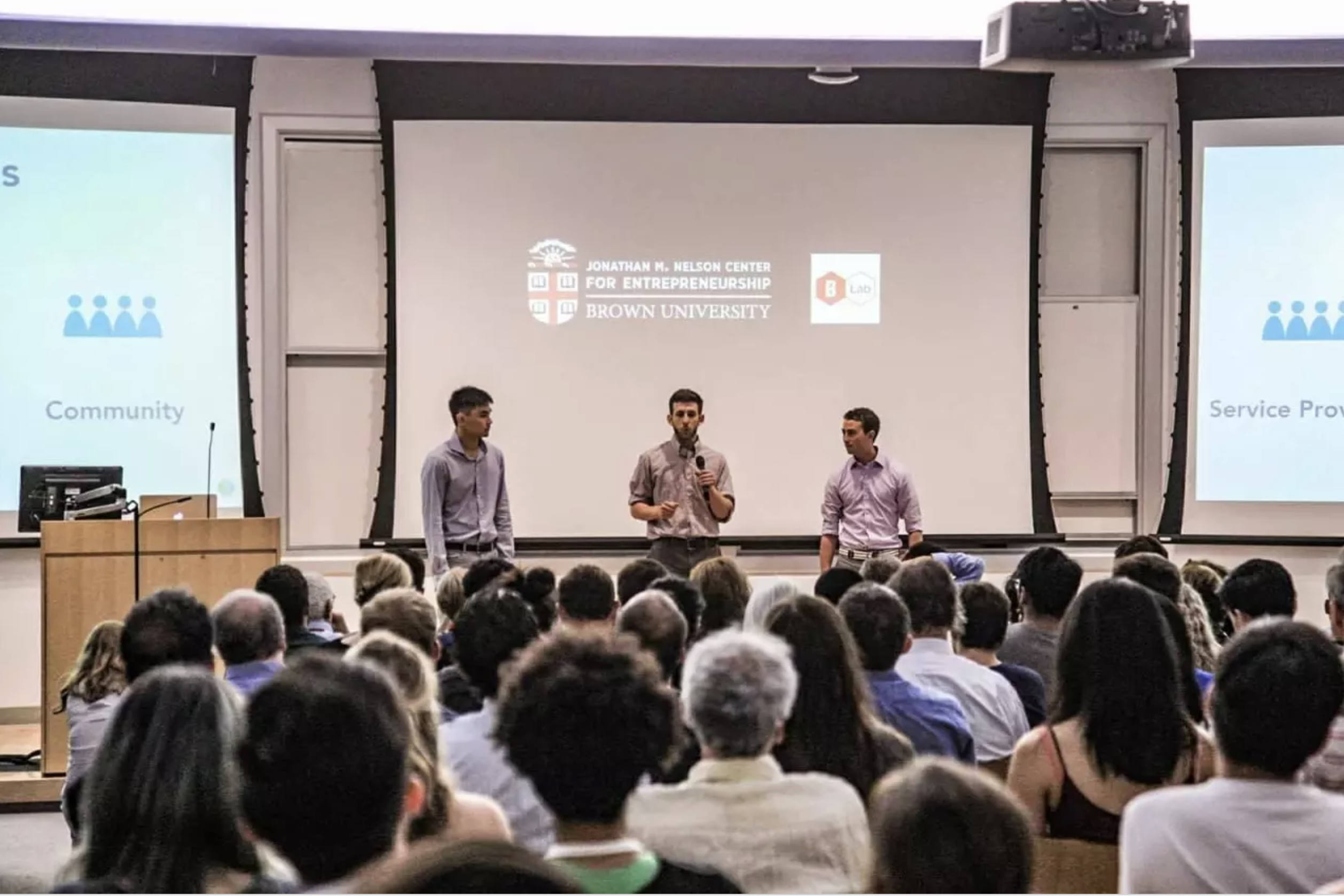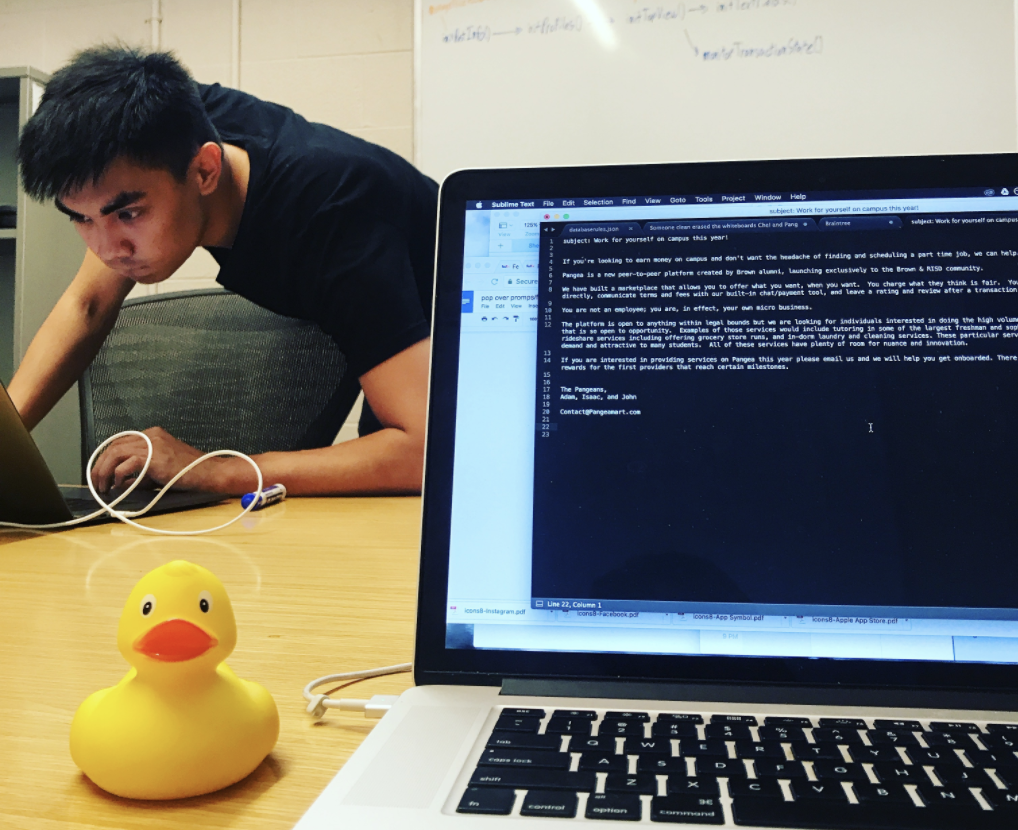PANGEA PRESS
THE TALK OF THE TOWN
Westchester Natives Hope To ‘Unite The World’ With New App
The Daily Voice (9/27/17)
John Tambunting of Scarsdale, Adam Alpert of Harrison, and Isaac Zussman of Pawtucket RI are the brains behind Pangeamart, an app that connects gig workers — those in the freelance space — with jobs.
It was born in Alpert’s sophomore year at Brown University when Zussman, his roommate’s friend, brought up the idea in a casual conversation after a frustrating summer looking for odd jobs. Alpert, a freelance videographer, thought the idea had legs and proposed some next steps. The two got to work but didn’t get serious until their junior year when Tambunting, who literally taught himself how to build the app, joined in.
Fast forward to earlier this summer when the three — they are 23, 22 and 28 –secured coworking space, mentorship, and a bit of funding from Brown as part of the school’s summer accelerators called the Breakthrough Lab.
Outside of the little grant money they raised, they are entirely bootstrapped. Alpert said they are “pre-seed, pre-revenue” and are hoping to court potential investors.
In the meantime, Pangeamart, which comes from the word Pangea, the most recent supercontinent (think 250 million years ago), is limited to those with a Brown University, Rhode Island School of Design, or Johnson & Wales University.edu address.
“It’s basically a soft beta launch so we can work out any kinks before bringing it to a wider audience,” said Alpert.
“We have plans to bring it to schools nationwide after this academic year and the intention is to eventually bring it to the surrounding communities.”

Pangea’s mission, he said, is to create a unified free market in which everyone can participate.
“We can unite the world by bringing together communities through commerce.”
And yes, the goal is international.
“We believe a platform like Pangea would be a tool for economic empowerment in countries that were previously colonized and lack the necessary infrastructure to promote internal economic development,” explained Alpert.
For now, the audience is college students who want to operate their own side-business. Down the road, it’s anyone who wants to pursue and share their passions and become self-employed.
For it to work, “Pangeans,” download and register for free. Users then access the main feed, where they can choose among three separate toggles: goods, requests, or services and search from there. Upon finding a service — say a web designer — the user can expand on the designer’s profile, chat with him/her and negotiate a price. After booking the service, users pay in-app and are able to rate each other.
The founders take 10 percent and the payment platform takes 2.9 percent; the goal is to eventually become free.
All in due time, said Alpert who, from his base in Providence, is optimistic about the company’s future.
The Harrison native likes to tell the story of how the three co-founders and housemates, in the first days of moving in together post-college, ended up with no electricity or internet for a week due to a scheduling mishap with their utility provider.
“We launched a tech company out of a glorified tent,” he said.
“This is emblematic of the fact we are lean and scrappy and we won’t let anything stand in our way.”

Brown Students Unveil Pangea, a Coed Peer-to-Peer Marketplace (For Now)
Rhode Island Inno (9/18/17)
Pangea, if you recall, is the name for Earth’s singular supercontinent before ice ages and years of tectonic shifts separated said land mass into today’s seven. It’s a word synonymous with connection and unity, and for Adam Alpert, it was the best term to summarize the mission of his startup.
Pangea, or Pangeamart, has focused its efforts on developing an app that connects those with a “side hustle” (skills used to earn supplemental income) with others looking to benefit from those skills. It “provides the tools to list any services and goods you are willing to sell, build your legitimacy and credibility as a provider, and conduct peer-to-peer transactions,” its website states.
Unsurprisingly, like many startups, Pangea was officially born in a dorm room; one at Brown University, to be specific. Alpert, who just graduated from Brown this year, was a sophomore at the time, and a friend (who would go on to become the app’s co-founder and chief creative officer), Isaac Zussman, pitched the idea that would become Pangea. His plan was inspired by years of travel, during which Zussman had more difficulty than he felt he ought getting odd jobs.
“OVER 40 MILLION AMERICANS HAVE A SIDE JOB; WE WANT TO [ENGAGE THEM ALL] EVENTUALLY.”
Alpert was sold on the idea, and after joining the team, recruited fellow Brown student John Tambunting. He taught himself to build the app, which he did “98 percent from scratch,” Alpert said.
The result allows users, or “Pangeans,” to download and register on the app for free. Pangeans can then access the main feed, where they can chose three separate toggles: goods, requests, or services, based on their needs, and search from there. Upon finding, say, a videographer service, the user in question can then expand the videographer’s profile and get a feel for their offerings and skills, chat with him or her, or negotiate the price. After booking the service, users pay in-app and are able to rate each other.
The team’s journey to a completed app (formally launched this past Friday) has been mostly self-funded, with few exceptions, Alpert told me. “We got a $500 grant from Brown, as part of Brown’s summer accelerators — the Breakthrough Lab,” he said. “Other than that, we are pre-seed, pre-revenue.” Alpert added that the team is participating in the B-Lab’s Pitch Night, where they would be hoping to court potential investors.
For now, keeping the audience local and college-age is ideal. Students are, after all, “highly connected, underemployed, [and] densely populated,” he added.
The next three months will be about drumming up excitement amongst that college-focused, initial market. “Getting people paid would be a success,” Alpert said.
He added that Pangea was fundamentally more than a transactional service. “I want to … facilitate face-to-face connection,” he said. “[It’s] about connecting and unifying people.”


Pangea’s mission, he said, is to create a unified free market in which everyone can participate.
“We can unite the world by bringing together communities through commerce.”
And yes, the goal is international.
“We believe a platform like Pangea would be a tool for economic empowerment in countries that were previously colonized and lack the necessary infrastructure to promote internal economic development,” explained Alpert.
For now, the audience is college students who want to operate their own side-business. Down the road, it’s anyone who wants to pursue and share their passions and become self-employed.
For it to work, “Pangeans,” download and register for free. Users then access the main feed, where they can choose among three separate toggles: goods, requests, or services and search from there. Upon finding a service — say a web designer — the user can expand on the designer’s profile, chat with him/her and negotiate a price. After booking the service, users pay in-app and are able to rate each other.
The founders take 10 percent and the payment platform takes 2.9 percent; the goal is to eventually become free.
All in due time, said Alpert who, from his base in Providence, is optimistic about the company’s future.
The Harrison native likes to tell the story of how the three co-founders and housemates, in the first days of moving in together post-college, ended up with no electricity or internet for a week due to a scheduling mishap with their utility provider.
“We launched a tech company out of a glorified tent,” he said.
“This is emblematic of the fact we are lean and scrappy and we won’t let anything stand in our way.”
Want to keep up with our latest updates?
Follow us at @thepangeans.
